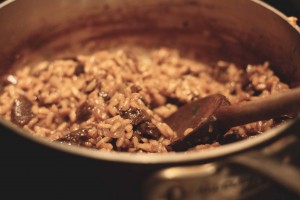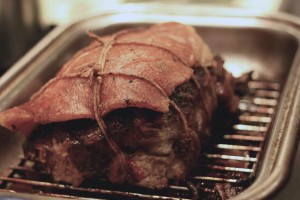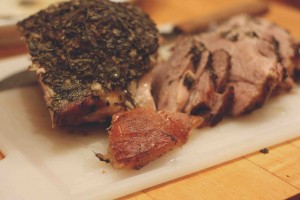Recently, I’ve been having a lot of conversations about being where you are, and about issues of community, and how so many of us spend all (or at least most) of our time thinking about places where we’ve been, or where we aren’t. I’m not sure if it’s a distinctly human construct, or just an American one, to not pay attention to the here and now and instead to constantly look forward or backward. It’s a little bit crazy making; how much do we lose and how much do we miss when we’re not paying attention to where we are? What, exactly, are we afraid of?
Spring and summer seem to be the times when we look forward the most: we’ll plant a garden and have no idea what the thing will look like in two or three months. Last year, everyone I know went crazy planting tons of tomatoes, and on the east coast, we were hit with blight so bad that whole gardens had to be ripped out and burned. Worse, nothing else could be planted in those spots this year, because the ground was still infected. Sometimes, you just don’t know. But even the food we enjoy during those seasons tends to be prepared and eaten more quickly, like we’re rushing off to do something after our meal, even if we’re not: we grill over high heat, we make quick, fresh tomato soup (granted, with day-old bread), add a handful of herbs and a grating of cheese and a quick drizzle of olive oil. We pan-sear fresh fish, give it a squeeze of lemon, and we’re done and ready for more cold beer. Many of us want quick ‘n’ easy, to get us in and out of the kitchen and on to the next thing in our lives, which we also rush through.
But autumn and winter are very different. The last few days have rained biblically, and there was nothing we could do; we couldn’t rake the leaves, we couldn’t cut down the garden, we couldn’t plant the two boxwoods we bought for the front of the house, we couldn’t take the dogs on a hike. There was nothing to do but be where we were and cook, and that’s probably what I love so much about fall. It’s true that on Friday night, I was already thinking about Sunday supper, which is one of those weird meals that demands you plan ahead (there’s often marinating or brining or curing or baking involved), and then you get to sit around. You pour yourself some wine, you wait for the damn thing to cook, and you’re forced to be where you are until dinner’s ready.
Normally, if I have something special in mind for Sunday supper, I plan several days ahead; I ask Susan, who works in Manhattan, to pick up what I need — the pastured lamb, the pork shoulder, the guinea hen — but this time, I went right down the road to my local butcher, Steve Ford, whose tiny shop is nestled in a corner of a deli on Main Street. He’d just processed two pigs, he said, and a Boston butt would be perfect for porchetta. I was already thinking about it when he said the word: his Berkshire pork, from a nearby farm, is rosy and tastes like what pork should taste like, and porchetta would take me in the neighborhood of two or three whole days of patience before we could roast it—which would take hours—and eat it. But hell: no where to be on a late Sunday afternoon in the fall but where we are, which is home. I also picked up a package of dried porcini, because if I’m going to bother to be present for the process, as they say, I might as well also make mushroom risotto (which demands that one be present for the process). 
So, my neighbors are starting to cut up their wood (I’m hearing a lot of chain saws and they’re driving our dog crazy), it’s actually getting chilly, and the time for being where we are—in a smallish, funky ranch house in quasi-rural Connecticut, in the kitchen with the dogs and the partner and a giant stack of my favorite books and a really great porchetta in the oven and a wild mushroom risotto on the stove—is here.
And really, I don’t much want to be anywhere else.
Some years ago, I was invited to a party attended by a bunch of Connecticut food people. They included a crowd of crazed Boules players, along with Jacques Pepin, his wife Gloria, and his poodle, Paco. Memorably, the hosts served a mind-boggling porchetta that had been salted and rubbed and coddled and cajoled for three or four days, and then slow-roasted until it fell apart. I’ve always strived to make that specific porchetta — it was outrageous in its smoky herbaciousness—until now, when I decided that IF I was going to really make it a point to be where I am, I was going to make my own version of the dish, and not someone else’s that I had years ago (even if it was spectacular). My butcher asked the key question when he wrapped the pork up for me: “I assume you’ll want the skin?” I did. Sure, I wanted to crisp it and nibble on its glazed crackly goodness, but I also wanted it to serve as a cap that could be tied into place above a thick paste of the last of my garden’s herbs, smashed garlic, fennel seed, and pepper.
The result was tender and flavorful but not overpowering. Tonight—two days later—we’ll slice it thinly, and serve it on grilled rolls topped with a dollop of room temperature, leftover rapini with garlic, and drizzled with a little olive oil. 
Serves 6
2 teaspoons fennel seed
2 teaspoons black peppercorns
3-4 sprigs fresh rosemary
3 sprigs fresh thyme
3 sprigs fresh oregano
3 sprigs winter savory
4 cloves garlic
Extra virgin olive oil
1 3-1/2 pound, boneless pork butt (ask for the skin)
1/2 teaspoon kosher salt
1/2 cup dry white wine
Using a mortar and pestle, gently pound the fennel seeds together with the black peppercorns, and set aside. Place the herbs and garlic together in the bowl of a food processor, and pulse until loosely chopped; drizzle in just enough olive oil so that the contents come together as a paste. Fold in the crushed fennel seed and black pepper.
Remove the skin from the pork roast, and slash the surface of the meat diagonally with a very sharp paring knife; massage the meat with the herb paste, making sure to get the paste beneath the surface of the scoring. Top the meat with the skin (fat side-down), and tie it into place. Place on a platter, wrap well, refrigerate for 2-3 days, and go about your business.
Remove the pork from the refrigerator, unwrap, and let it come to room temperature, loosely draped with foil. Preheat oven to 300 degrees F. Sprinkle the meat with the salt, drizzle lightly with olive oil, and place it on a rack in a small roasting pan (if you don’t have a small roasting pan, use an ovenproof casserole, and put the pork on top of a layer of sliced potatoes). Roast uncovered for 2-1/2 hours, drizzle with the wine, and return it to the oven for another 2-1/2 hours, basting every 20 minutes.
Set the pork on a platter or meat board, cut the strings, and lift the skin off. Loosely tent the meat with foil, and let it rest for at least 15 minutes while you return the skin to the roasting pan; place the skin back in the oven for another 10 minutes, basting it every few minutes until it is mahogany brown (make sure it doesn’t burn).
Slice the pork and serve with sauteed rapini and garlic.








I also made pork this weekend, braised a 9-lb shoulder with garlic, onions and sage, and we’ve been living on it every day since–made sandwiches, roasted the potatoes in the (copious) fat and ate them with crackling and sauteed broccoli rabe, and tonight, there’s just enough left to approximate the Pork Ragu from Maialino in the NYT. You’ve made me yearn to go home and get on with dinner this evening!
We had pork on Sunday night too. A loin roasted simply with just salt and pepper to bring out the flavor and some whole heirloom apples tossed in the bottom of the roasting pan. Red Swiss chard and baked blue potatoes with crispy skins rounded out the side dishes. On Monday we just had to make Cuban sandwiches with the leftover pork. No panini press needed if you’ve got two cast iron pans and a heavy tin of olive oil for weight :).
what is it about Sundays and pork?
Pork?
I guess the Jew in you is on vacation.